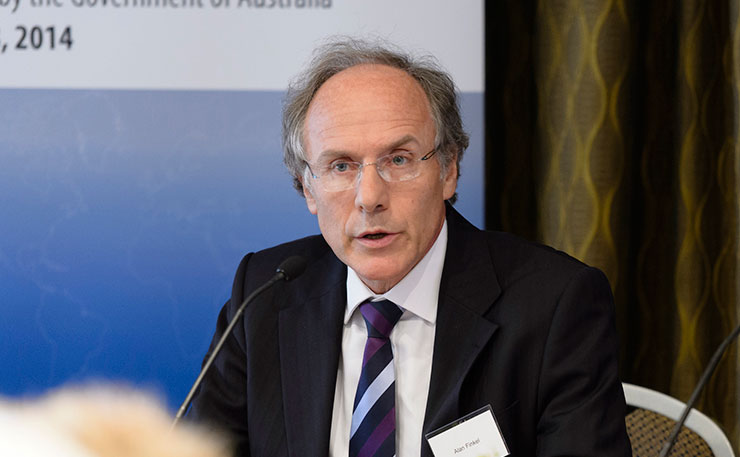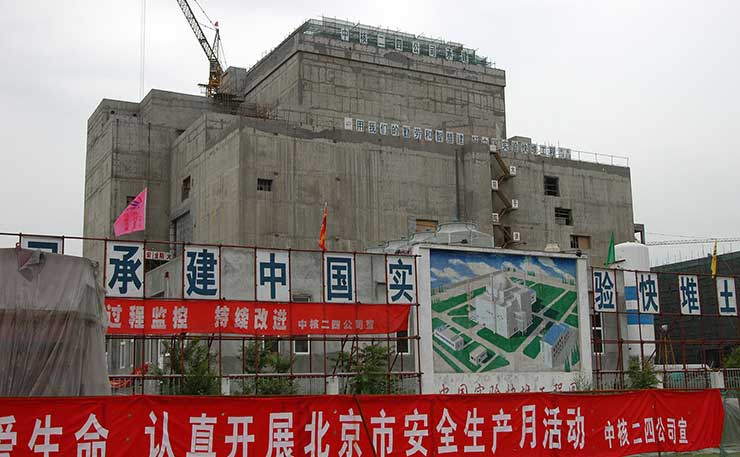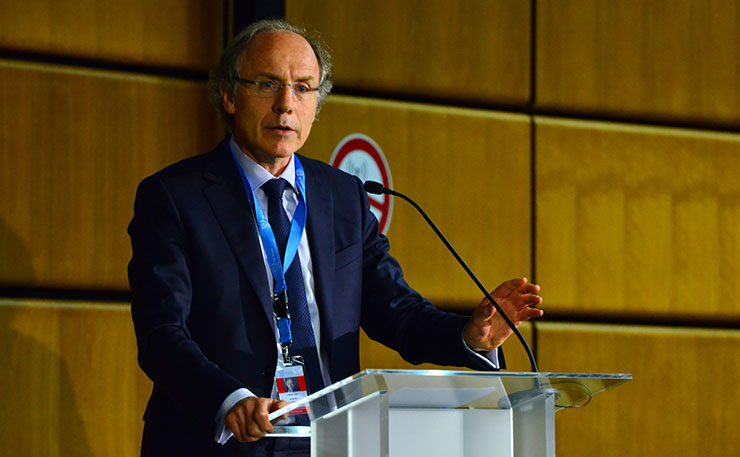If there’s one thing science should be, it’s above politics, writes Geoff Russell.
Remember when Alan Finkel was announced as Australia’s new Chief Scientist back in October 2015? The SMH headline said it all: “Australia should think nuclear and ditch coal, oil and gas …”. This puts him in good scientific company. Four of the world’s top climate scientists were in Paris at COP21 some weeks later advocating for nuclear power as a planet saver.
James Hansen, Kerry Emanuel, Ken Caldeira and Australia’s own Tom Wigley would make it into anybody’s list of top 20 climate scientists. Hansen has also published on nuclear issues; in particular estimating that nuclear power had saved some 1.8 million lives in recent decades by displacing coal.
A year earlier, our own Professor Barry Brook published a plea for nuclear signed by 75 top scientists, mostly ecologists and biologists. The plea was an open letter and noted the real-world problems associated with renewables; scalability, cost, as well as material and land use.
To ecologists, land use is just another name for habitat appropriation, which may not matter to those advocating big dams; wind and solar farms; biomass from crops and forests; not to mention children mining cobalt in the Congo for lithium batteries; more lead mines for Richard Di Natale’s lead-acid future; and a many fold increase in chemical factories pumping out millions of tonnes of sodium and potassium nitrate for solar thermal storage. But it matters to ecologists and it matters to me.
We could perhaps wear the ecological costs of renewables if they worked. But they don’t. Without batteries, they are just a boutique supplier.
As time marches on and renewables fail to deliver robust, clean, eco-friendly electricity, there is always another excuse; we need big lead-acid batteries, lithium batteries, smart grids, pumped hydro, more interconnectors, bigger interconnectors.
Nuclear power is a mature technology which has been working for decades and still has capacity for a 100-fold improvement in efficiency. Renewables were tried and failed in the 1970s during the oil crisis. Germany doesn’t expect using renewables to hit an emissions target which France achieved 25 years ago with nuclear.
Is the falling price of solar and wind farms relevant? It is if you think that cheap bicycles will displace cars and B-double trucks and fix that part of our climate problem.
All up, renewable implementation problems make betting the planet on them not just a high-risk strategy, but an ecologically damaging one. Sun and wind might be renewable, but the resources used to harvest them are just like any other, and nuclear is simply cleaner, greener and far more animal-friendly.
Fast forward 12-months and what has happened to our Chief Scientist?
RenewEconomy asked him recently about nuclear and reported that he didn’t see over the 20-year horizon any technologies being proven or cost-effective, and thus getting funding.
Is he joking? Perhaps Google was down that day. How has he managed to ignore China? They are the biggest single greenhouse emitter, have rather a large chunk of the world’s population and are investing heavily in energy technologies of all kinds; including nuclear. They are making extraordinary progress in fighting climate change on all fronts; not just energy.

They recently enlisted Arnold Schwarzenegger to help in their campaign to halve meat consumption. In contrast, Australia has more cattle than people and doesn’t give a damn about their climate impact, or their 30-year degradation of the Great Barrier Reef or the thousands of cancers they cause annually.
At the time of the RenewEconomy interview, Finkel was about to embark on a trip to look at renewable energy in some pretty nice tourist destinations; California, New York, Denmark, France the UK and Germany. But why not China? He could have looked at renewables and nuclear in China. But it seems his mind is made up. Or perhaps been made up for him.
Sources tell me he got “slaughtered” for mentioning nuclear. Sources tell me that politicians told him nuclear was unpopular. Those sources are consistent with the summary dismissal of nuclear reported in RenewEconomy.
Anybody concerned with climate change who isn’t paying close attention to China is living in some kind of filter bubble. Nuclear technologies are getting serious funding in China not in the next 20 years, but starting over 20 years ago. And the Chinese know how to plan. Since 2000, they have been building supercritical coal plants. Why is this a big deal?
It isn’t because they produce less CO2 than a normal coal plant. That’s true of course; because they run at higher temperatures and produce not just less CO2 but less of other pollution; but that’s not what makes them a big deal.
In 2006, the jig-saw puzzle of Chinese long range planning started to take shape when she announced that high temperature gas cooled nuclear reactors (HTR) would be a priority for the next 15 years.
Note the use of the words “high temperature” for both coal and nuclear.
A coal-fired electricity generating plant is basically just a boiler connected to a turbine connected to a generator, and a bunch of stuff to cool it all down. If you plan it right, and the Chinese have, then you can unplug a coal boiler and replace it with a nuclear boiler; in this case a particular kind of HTR… a high temperature pebble bed nuclear reactor (HTR-PM); which is a boiler which produces steam at precisely the right temperature for the turbines in their supercritical coal plants.
Think about it. You preserve all the money invested in the rest of the plant and the potential for rapid decarbonisation is breathtaking. With the first HTR-PM being planned for commercial production this year, the first coal-to-nuclear conversion could come on line in 2018.
HTR’s can also be used to produce hydrogen efficiently; which is also a very big deal, because hydrogen will be one of the ways of decarbonising transport.

In my view, a Chief Scientist who gets involved in energy and climate change but ignores China is a serious problem; and one who buckles before political pressure is no Chief Scientist at all. A Chief Scientist worthy of the name considers the climate risks we face, and looks at our options for dealing with it and makes recommendations based on the facts. It’s not his job to consider the popularity of such advice.
The South Australian Chief Scientist, in contrast, has urged us not to rule out nuclear power. At least she has some intestinal fortitude.
Imagine we had a Trump for Prime Minister and our anti-vaxxers got gung-ho and bolshie following appointment to high offices in our health infrastructure. Would we expect our Chief Scientist to crumple and roll over? I bloody well hope not.
Finkel also appears to be seriously lacking in his understanding of the basic principles of scientific empiricism. Is nuclear power really unpopular in Australia? With who? Politicians? The Greens? The people? If the people matter, then the only way to find out if nuclear power is unpopular is to poll them. Employ a reputable polling company to use a random sample and some good questions.
Many people were astonished that Jay Weatherill stuck to his guns by refusing to rule out a nuclear waste repository after it was rejected by a Citizen’s Jury. The reason was that the Citizens’ Jury didn’t represent the views of the public as well as a random sample poll, and Weatherill had the polling. He knew, and knows, that the waste repository is still quite popular. Weatherill seems to understand the difference between self-selected polling and random polling, and had the courage to bet his job on the difference. It seems our Chief Scientist either doesn’t understand this most basic of statistical distinctions or is simply desperate to avoid Green sledging.
Knowing the popularity or otherwise should be irrelevant to the substance of any recommendations flowing from a Chief Scientist, but it may well determine the way advice is presented. It may also determine the subsequent work needed to sell the advice. If nuclear is unpopular, then why and what can be done about it?
Royal Commissioner Kevin Scarce squandered some of the opportunities afforded in the preparation of his Royal Commission report. He recognised and rejected the fear campaign run by anti-nuclear forces but never effectively faced it head-on and demolished it. He never confronted the obsolete science, misdirection and deception at the heart of the fear.
Now we have a Chief Scientist capitulating to political expediency.
His preliminary report into the future security of the National Electricity Market doesn’t mention nuclear power at all. He should resign and make way for someone with their eye on the ball and better suited to giving independent fearless advice.
Donate To New Matilda
New Matilda is a small, independent media outlet. We survive through reader contributions, and never losing a lawsuit. If you got something from this article, giving something back helps us to continue speaking truth to power. Every little bit counts.





